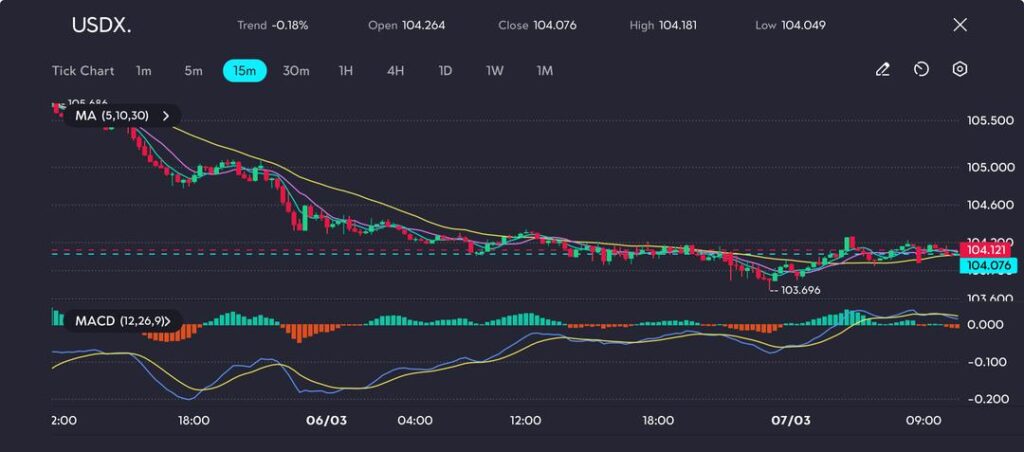
Key Points:
- The U.S. Dollar Index (USDX) dropped to 104.07, hovering near a four-month low as shifting U.S. tariff policies spurred uncertainty.
- The euro climbed to 1.0803, marking a strong four-day rally as European bond yields surged on Germany’s stimulus plans.
Dollar Weakens as Market Awaits U.S. Jobs Data
The U.S. dollar index (USDX) closed at 104.07 on Friday, reflecting continued downward pressure as concerns over U.S. trade policies and growth prospects intensified. The dollar struggled to gain footing despite temporary tariff exemptions announced by U.S. President Donald Trump, which provided little relief for traders.
A one-month extension on auto import tariffs for Canada and Mexico led to a muted response in FX markets, while broader fears of slowing U.S. growth kept dollar bulls cautious. Traders turned their attention to the upcoming U.S. non-farm payrolls report, seeking confirmation of whether the economy is cooling further.
Technical Analysis
The US Dollar Index (USDX) is down 0.18%, reflecting continued weakness. The price opened at 104.264 and closed at 104.076, after reaching a high of 104.181 and a low of 104.049. The moving averages (5, 10, 30) are sloping downward, confirming a prevailing bearish trend, though recent price action suggests potential stabilization. The MACD is slightly improving, indicating that selling pressure may be easing.

Picture: USDX steadies near 104.08 after extended bearish pressure, as seen on the VT Markets app
For a possible recovery, USDX needs to break above 104.20, which could trigger a move toward 104.50-104.70 resistance levels. On the downside, support is found at 103.70, and a break below could accelerate losses toward 103.50 or lower. Traders should monitor Federal Reserve commentary, U.S. economic data, and global risk sentiment, as these will heavily influence the dollar’s direction.
Market Expectations for the U.S. Jobs Report
Economists forecast the U.S. economy added 160,000 jobs in February, compared with 143,000 in January, while the unemployment rate is expected to remain at 4.0%.
On Thursday, job cuts announced by the U.S. federal government reached 62,242, contributing to a 172,017 increase in planned layoffs across multiple sectors—figures not seen since the last two recessions.
Federal Reserve Chair Jerome Powell is set to speak later today, and traders have priced in 77 basis points of Fed rate cuts for 2025, with markets closely watching the jobs report for signs of further economic slowdown.









